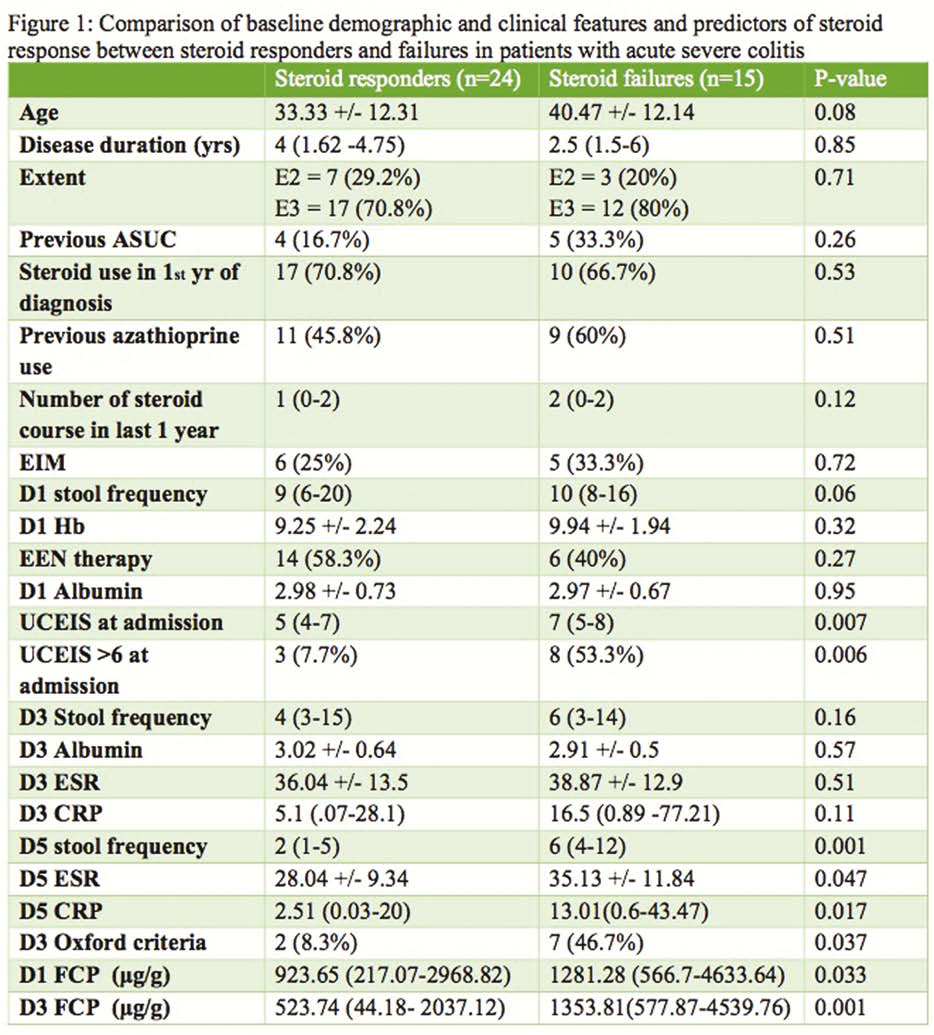P209 Prospective validation of faecal calprotectin as a predictor of steroid failure in patients with acute severe colitis
P. SAHU1, S. Kumar1, S. Jain1, N. Singh Mohil1, P. Sahni2, S. Pal2, N. Ranjan Das2, B. Nayak1, V. Sachdev1, M. Kumar Singh1, S. Kedia1, G. Makharia1, V. Ahuja1
1Department of Gastroenterology, All India Institute of Medical Sciences, New Delhi, India, 2Department of GI Surgery, All India Institute of Medical Sciences, New Delhi, India
Background
Optimal outcomes in acute severe colitis (ASC) are related to time-bound management based upon an early prediction of response to intravenous (IV) corticosteroids. We have demonstrated good diagnostic accuracy of day 3 faecal calprotectin (FCP) in this setting. The present study intended to validate these findings in a different cohort.
Methods
This prospective cohort study included IV steroid naïve (for this episode) patients with ASC, satisfying Truelove and Witts’ criteria, hospitalised from September 2018 to August 2019. Patients were subjected to baseline sigmoidoscopy, day 1 and day 3 faecal calprotectin, baseline hemogram and biochemistry, and day 3 CRP. All patients received IV steroids after hospitalisation, and the primary outcome measure was steroid-failure defined as colectomy and/or rescue therapy with ciclosporin or infliximab during admission.
Results
Of 47 patients with ASC, eight were excluded (four received steroids outside, 2-directly taken for surgery/infliximab therapy, 1-toxic megacolon on day 1, 1-infectious colitis), 39 were finally included [mean age−36.08 ± 12.58 years, male (30.7%)]. Fifteen patients (38.5%) failed IV steroids and required rescue therapy (10 infliximab, 2 cyclosporine, four surgery). On univariate analysis, the factors significantly different between steroid responders and steroid failure included UCEIS >6 at baseline, Day 1 and Day 3 FCP, day 5 stool frequency, day 5 ESR and CRP, and oxford criteria (Figure 1). On multivariate analysis, only D3 FCP, UCEIS at baseline and Oxford criteria were significant predictors of steroid failure. Like the previous study, on ROC curve analysis, the day 3 FCP had similar diagnostic accuracy [AUC-0.86(0.75–0.98), and 1120.61 μg/g as a cut-off could predict steroid failure with 87% sensitivity and 79% specificity. Similarly, a combination of baseline UCEIS>6 and day 3 FCP>1120.61 μg/g had 100% specificity and positive predictive value for steroid failure.

Conclusion
FCP retained its value as an objective predictor of steroid failure in ASC.


